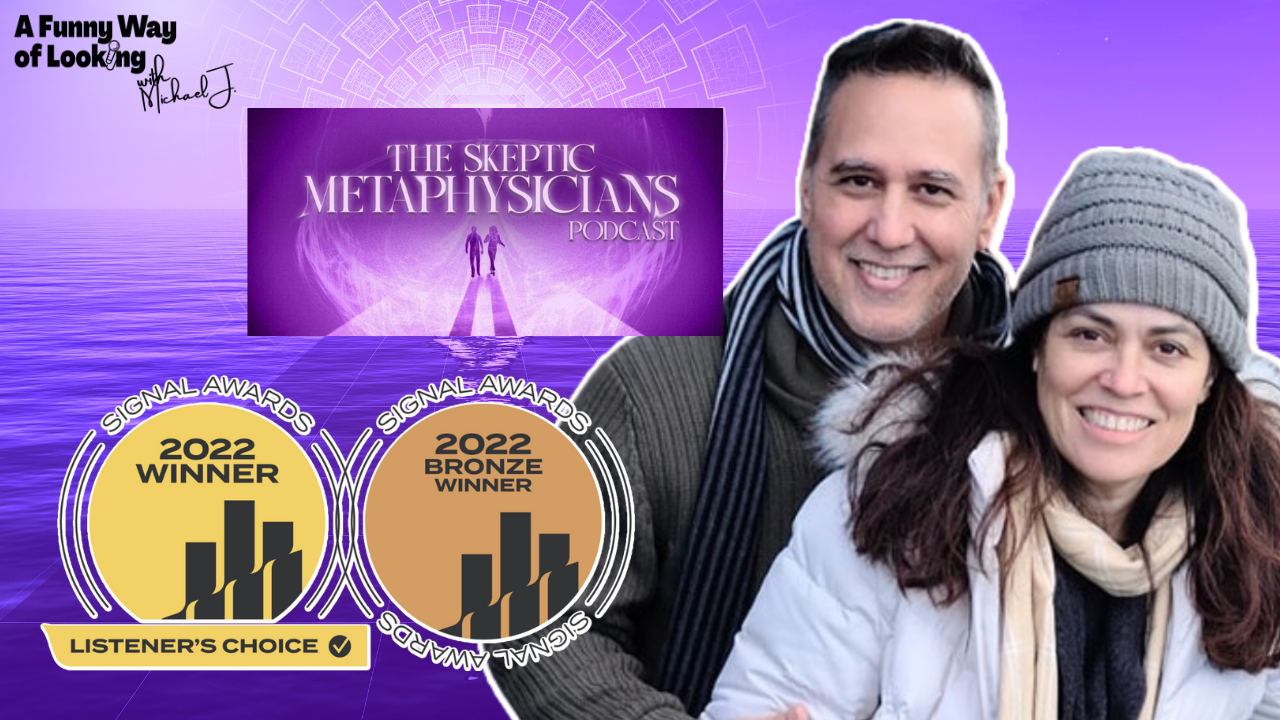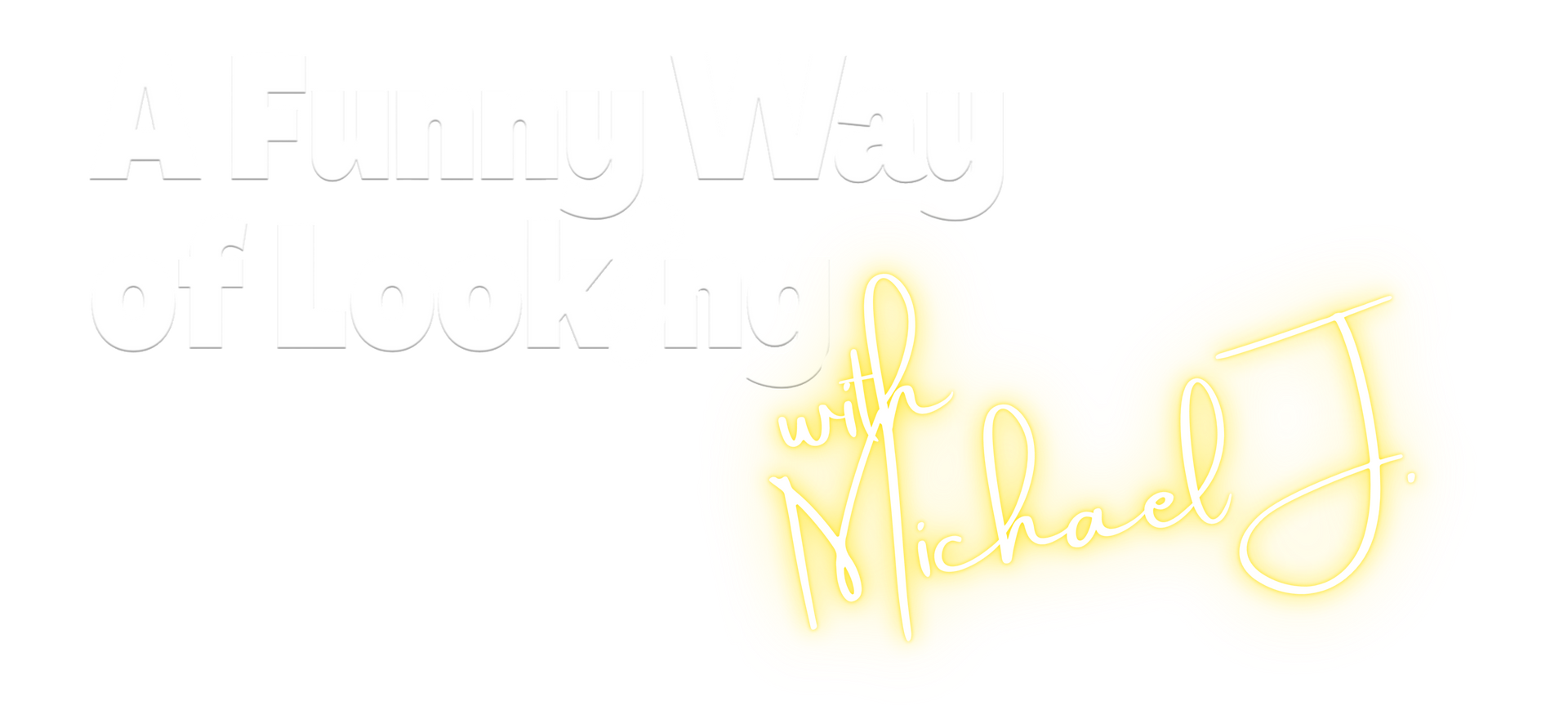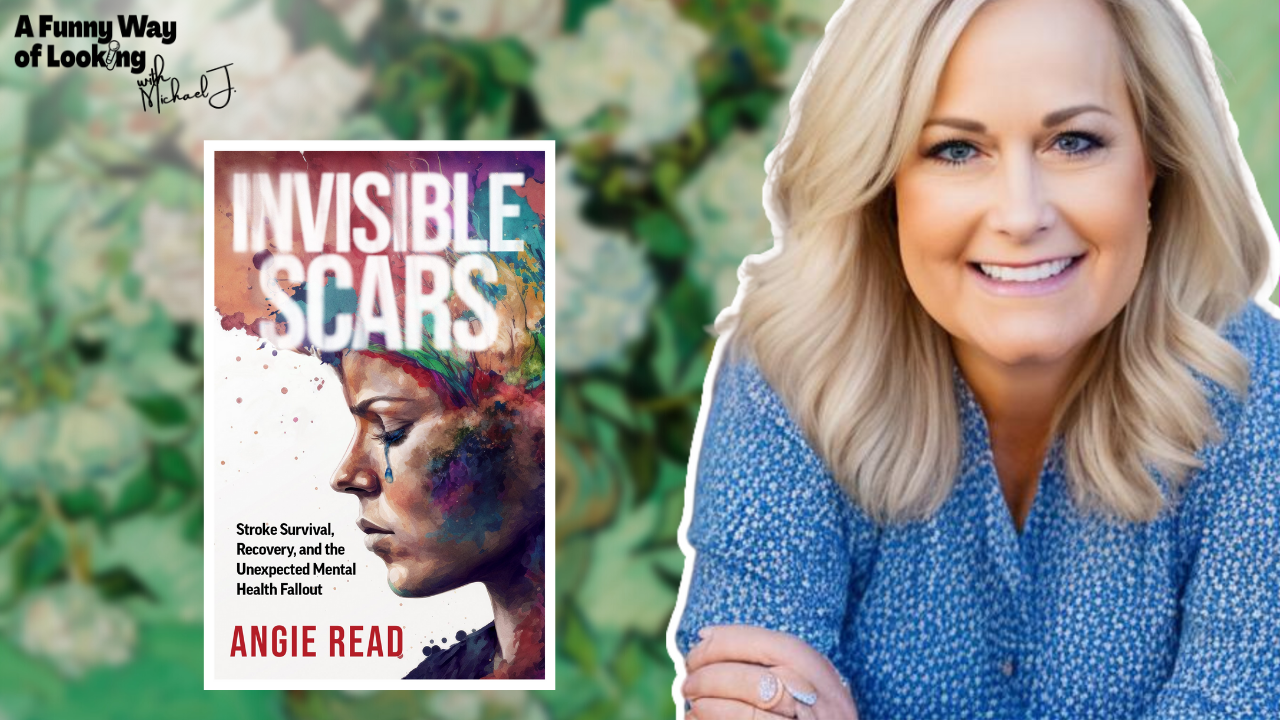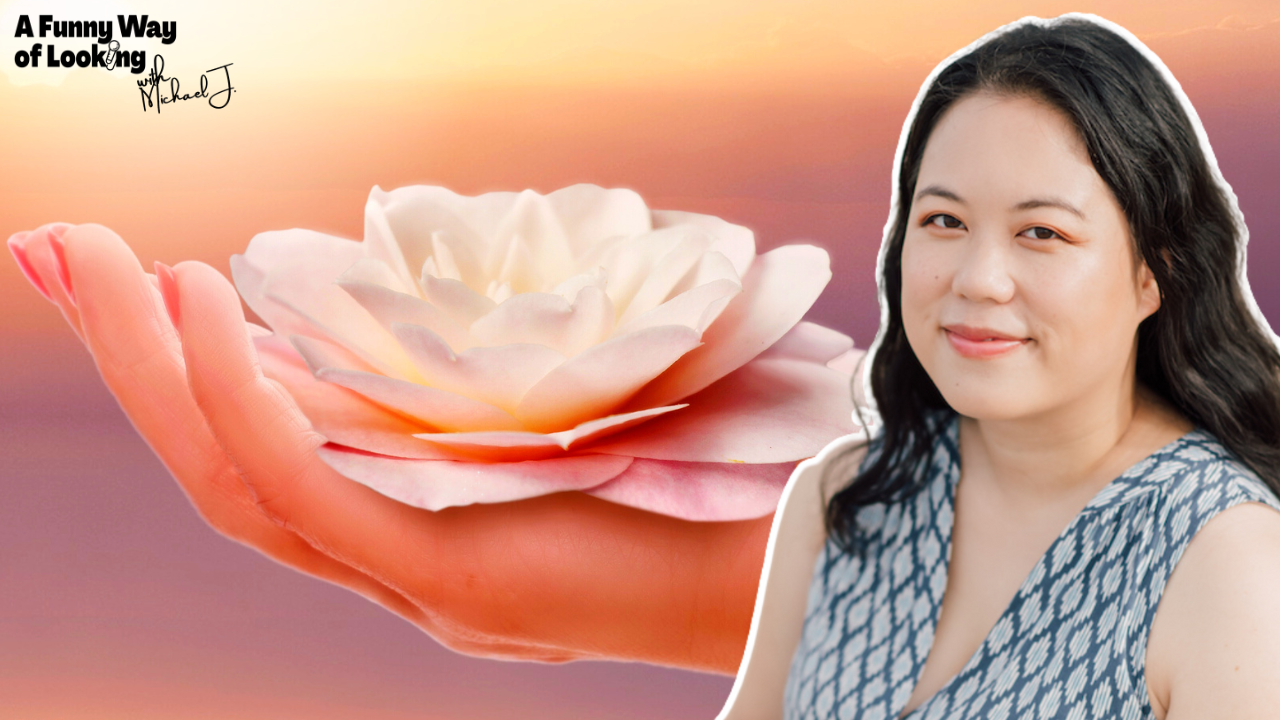The Dual Gender Experience
Savannah Hauk is living a confident, visible and successful male-to-female crossdressing life. Her eLit award-winning book series Living with Crossdressing helps demystify and destigmatize the dual gender experience for crossdressing men and their loved ones.
A Funny Way of Looking with Savannah Hauk
MICHAEL J: Detroit-born Savannah Hauk is a podcaster, advocate, TEDx Speaker and author of the book series Living with Crossdressing. Through a lifetime of experience and research, Savannah has come to understand the many reasons men crossdress, the struggles and fears they face, and the weight of the crossdressing labels they accept but may not truly understand.
Here's what I love: I love that I get to talk to people that are seen as different in society because I get to ask questions that everyone else wishes they could ask but they don't have access to ask, right? Which I think is fabulous. So, the show is really just for me, and everyone else just picks up later. Now I really want to open people's minds.
That's what the show is about – diverse voices, you know, looking forward and searching to find open minds. So, I think I read that you don't see transgender and cross-dressing as the same thing. They're different for you. Is that right?
SAVANNAH: Well, I will modify that crossdressing is not a gender. Crossdressing is an action. It is how I go from my male biology to what you see today. From crossdressing, it's just a mechanism to get me from point A to point B. But, it doesn't define my gender, and it doesn't define the reason why I do what I do. In that case, yes, some may think crossdressers are the same as transgender.
But, what I would tell people is that I don't identify my gender as a crossdresser; I identify as dual gender. Because I am not transitioning, I'm content with my male biology. This is just my outlet, my feminine outlet that I choose and desire to have. So, in the spectrum under the umbrella of transgender, I would fall under dual gender.
“
Crossdressing is not a gender; it's a way we express our gender, identity, and presentation.
I try to educate people and say, you know, because crossdressers tend to even be fetishized within the community, they get outlined. As a result, I'm trying to educate and say that crossdressing is not a gender; it's a way we express our gender, identity, and presentation.
So, if you want to self-describe and really delve into why you crossdress, you need to examine that. Maybe you do want to transition, perhaps you do it for fetish reasons, as it's a more sexual experience. Maybe there's something within you that needs some sort of outlet, like myself. I don't know why I am the way I am, but I know I'm content with my male side and unhappy with my female side. Therefore, I say I'm bi-gender, genderqueer, dual gender—take your pick; the labels keep on coming.
MICHAEL J: This is a question I've asked a lot of people, and I'm not sure I've found a good answer yet. But, if we were in a society where, for the most part, women didn't typically wear makeup, have longer hair, wear lipstick, wear dresses, and present in our society as female.
If we were in a society where that wasn’t a thing, and people just wore protection on the genitals because you don't want to climb a tree and get scratched up or you cover up the top, not because of impropriety but because you want to climb the tree, you don't want to scratch up your chest. If that was the case, how would one be a trans non-transgender but a crossdressing person?
SAVANNAH: Well, in your dystopian future that you've created for me? Not unlike the Twilight Zone episode where everybody needed to conform and look exactly the same. And all in the same jumpsuits, I would actually have given you a pass with everybody wearing the same jumpsuit. But there are two things at play. There is the shape of our bodies.
Now, in this world that you've created for me, are men and women identical in all ways, very androgynous except for genitals, or do we still have a president, right? Yeah, and so in that way, we would probably still find a way to mimic those curves to have our brains see ourselves in that guise. And then, as you said at the outset, well, if I'm climbing a tree, you know, I'm gonna get my good scratched up, right?
As a crossdresser, within that trade, I'd just exchange the athletic cup for the athletic cup and the breezier press plate. We would take whatever society deems as feminine, and that would be what I would try to emulate.
MICHAEL J: Okay, gotcha. Have you ever asked yourself, why do you want to be a crossdresser? Do people do this? Or is it just like,
“This is me, this is what I do”.
SAVANNAH: I'm both. I mean, I'm at a point in my life where I give left F's. So, for me, it's like, I'm not trying to prove to anybody why I am the lamb. I'm very happy and very confident, comfortable with who I am. There are still many, many, many, many people who don't see me as somebody who should be in society. And that is something that I do struggle with - their invalidation.
But for me, just on my own, I'm very happy. I've been doing this since I was five. So, this is not like, a sexual play through adolescence. This is just part of who I was; I had this attraction to it from that early in age. So, to try to figure out what wires are crossed, to make me want to do this? I've kind of set that aside, as I'll never know. But, I have come to very much love myself for the person or people I am.
MICHAEL J: What do you want people to know about? Do you want them to know about you? Do you want them to know about crossdressers? In general, do you have a message to the world about letting people let live and let live? You know, and that kind of stuff? What’s the message we want to get out?
SAVANNAH: Well, the message for me is more personal. And the message for me is because I have struggled, and I've done the work. I've done it on my own; I didn't really go to therapy to figure out who I am. But, I know a lot of people should or need to, or do. There are a lot of people who need to do some analysis, like really digging deep.
Do the research, do the reading, listen to podcasts, figure out what resonates with you. Because if you go through life blind to the person you are or your authenticity, then what happens is, you never come to a point of confidence and self-assurance that allows you to interact with others in the world on a grander level.
So, while people may be very happy staying in the closet and putting on their wife's nightie or something just because when nobody is home, for many, many others, that's not the life they want. They want to live a publicly seen, validated life in all their presentations. And I want those people to know that we are out here. And there are those of us who put ourselves in these positions of education and visibility. And they can do it too.
Sometimes it's just about finding that core and holding on tight and feeling the heat in that truth and letting it radiate out.
MICHAEL J: You know, it's interesting, I think, you know, back in the day, like when, and by the way, your point is what we're going to focus on for sure. Back in the day, and I'm gonna say the 60s and 70s, mostly, at least from what I can remember, there were musicians, and it used to be that all the Rock and Roll musicians were men. Right? And when there was somebody that stepped out of line, some female singer, everyone was like,
“Wait, there's a female singing rock and roll.” Right? And it was weird.
All of a sudden, now, people don't even think about it. It's just like,
“Okay, there's Heart. There's Pat Benatar. There's Blondie or whoever. And then there's Alicia Keys, and we've got Beyonce,” all that kind of stuff, right? I wonder, and there's a point to this, that we accepted as a society - woman singing rock and roll, men with long hair and glam and all this kind of stuff, right? Men with glam were cool.
But, when did it happen? Like it used to be, women had long hair; they had to have long hair. You got short hair, you were a guy. But, we've accepted that. And I think, and I'm just going off the top of my head, now there are probably more men crossdressers than there are perceived women crossdressers because it's okay for women to wear pants, for women to have short hair, and for women to not wear makeup.
So, are there female crossdressers? And how do you want to get to the point where men can dress as women and it seems as easy as women who now dress as men?
SAVANNAH: Yes. Oh, you said so much. And now I'm good. Just take it all down. First of all, in the '80s, glam rock and heavy metal had men with long hair and makeup. Somehow, people have forgotten that they were about as androgynous and female-looking as you could possibly be. But somehow, that was okay, but only in performance art, let's call them. Yes, I totally agree that the lane of heavy metal was fairly predominantly male.
I'm a huge Pat Benatar fan, so I appreciate you mentioning her name. And yeah, Blondie, Joan Jett, and they were outliers. They were like rebels because they were being hardcore in a very male and misogynistic, male-dominated music industry. So yeah, people have come to see Evanescence and Flyleaf, and all these bands that have come through with a female lead, it's just part of the fabric of the music industry now.
So, you're right, they found that. For me, the idea that, yes, women were tomboys in the '40s, '50s, and '60s and still wanted to have long hair. But you know, you chop it off, you throw away your bras, or wear pants, and that was a huge cultural shift in America, in Western culture, a huge shift.
But, if you look at Hepburn in the '30s and '40s, being one of the actresses to wear pants and being splashed across all the magazines at the time, people speculated like,
“Is she a lesbian? What is she trying to do? Why isn't she wearing a dress?” And she paved the way in the 20th century for it to be okay for women to dress more like men. And yes, I do want that the other way. I mean, I do want men to have the ability to just wear what they want and have it not seen as some fetishistic taboo that we need to annihilate.
MICHAEL J: Why is it okay for women? Because it wasn't. But, how did the women change the perception? And why can't men do the same thing?
SAVANNAH: Well, a couple of things. One, especially in 20th-century Western culture, who doesn't want to be a man? Yeah, that's the patriarchy at play. Everybody wants to be more like a man. Yes, absolutely do that. But like, why would you want to be the weaker sex? Why would you want to be more feminine? That's weird. Why do you want to do that? People in charge don't like to see that. That's odd.
You know, back in the day, the longer the hair on a male individual, the more they were honored and revered because Native American warriors had long hair, and that was a testament to them being warriors. So, something happened in the 1920s, '30s, and '40s, where all of a sudden, men needed to have short hair because that was what they needed to do. Therefore, there was a cultural shift, both for men and for women.
In the 1940s, when we went to World War Two, and all of a sudden, women were now in metalworking industries and making airplanes, enter Rosie the Riveter, where you had to wear pants. That was a shift that made it even more accessible for women to wear what they wanted.
And then there just came that point in time when hair for men had to be short, and long hair was associated with hippies and degenerates. People coming back from Vietnam who had no jobs, all of a sudden, long hair for men became stigmatized. Whereas 50 years prior to that, maybe even 80 years prior to that, in the mid-1800s, it wasn't.
So, it was just like this weird shift that everybody got behind, and all of a sudden, that was the norm, and we forgot that our forefathers wore high-heeled shoes with buckles, knee pants, satin pants, frills around the collar, powdered white wigs. And somehow, we've forgotten that that was the norm.
MICHAEL J: You know, it's weird. I think that I read that, because I'm thinking about the powdered white wigs and like our four founders, fathers and all this kind of stuff. They got rid of the wigs, I think because of either lice or something. And so, they stopped wearing the wigs all of a sudden, and went back to natural hair. And we have to look that up before we actually do the show and see if, if that's the case or not.
SAVANNAH: I thought it might be the opposite where they had their hair short. So, they wouldn't get lice and they wore the wigs as the prestige.
MICHAEL J: I don’t know. I’ll look that up.
SAVANNAH: That’d be interesting because I want to also look it up. I had read an article about the rise and fall of hair length for men at that junction point. I’m just going to find it.
MICHAEL J: You know, it's interesting also because, you know, my hair, I've had my hair short. It's actually long right now, but I keep it pretty short. But there was a point when I had dreadlocks; they were down to, you know, my shoulders, a little longer. And it was okay because I was, you know, from a different culture. I'm not sure. I guess I am, but I'm not white. So that's an interesting thing. I'm gonna do some research on that too, among cultures, like, where does the line get drawn?
SAVANNAH: When is it drawn? And we just kind of forget the line. Yeah, there was a line in the sand. We all crossed it together, we stamped it down. So, we couldn't see the line anymore. And now we're just heading in one direction forgetting what came before.
MICHAEL J: I'm guessing that it's going to be, if we really look at this, fear. And you're right about the white men, because who wouldn't want to be if you're going to be in power? That's the place to be. And if anything, that weakens that look in that control is probably not going to be accepted.
“
People fear what they don't understand. And they don't understand because they haven't put any effort into researching these topics about sexual identity or gender identity.
SAVANNAH: And people fear what they don't understand. And they don't understand because they haven't put any effort into researching these topics about sexual identity or gender identity. And what I tend to find in my own research is that nobody really researches for research's sake; nobody's out there just devouring things just because they want to know all their career students.
So, until you see somebody in power, let's say that was all against gay rights or against trans rights, under their stance changes, is usually because somebody very close to them fits one of those molds. And now they're pivoting because they realized they didn't know shit about it before.
MICHAEL J: That is actually that's very true. I think personal connection changes a lot of minds. So, maybe that's what we need to get people to be like,
“Come to our party, we're having a party and everybody here is cross dressing”. And one thing like you go to Halloween parties, no one has a problem dressing the way they want to dress. Manufactured, it's expected; and if you don't think you're an outlier.
By the way, you said that you still have a girlfriend? Right?
SAVANNAH: Yeah. Nine years.
MICHAEL J: Does she crossdress also? Or, she just accepts that what you do is what you do? Or how does that all work?
SAVANNAH: She is very proud of the person I am. It's taken her some time to understand it in her own way. And she had to do her own research and we've been together nine years and she's still coming to terms, but very proud of the person I am and the work I do and the books I write and talks I give. And yeah, so it's just like just having a celebrity in the house sometimes I guess.
About Our Guest
Detroit-born Savannah Hauk is a podcaster, advocate, TEDx Speaker and author of the book series Living with Crossdressing. Through a lifetime of experience and research, Savannah has come to understand the many reasons men crossdress, the struggles and fears they face, and the weight of the crossdressing labels they accept but may not truly understand. Find more about Savannah and read her full bio here.
To watch more A Funny Way of Looking, visit our
Episodes page. If you enjoyed this article and want more epic content,
subscribe to our newsletter!



